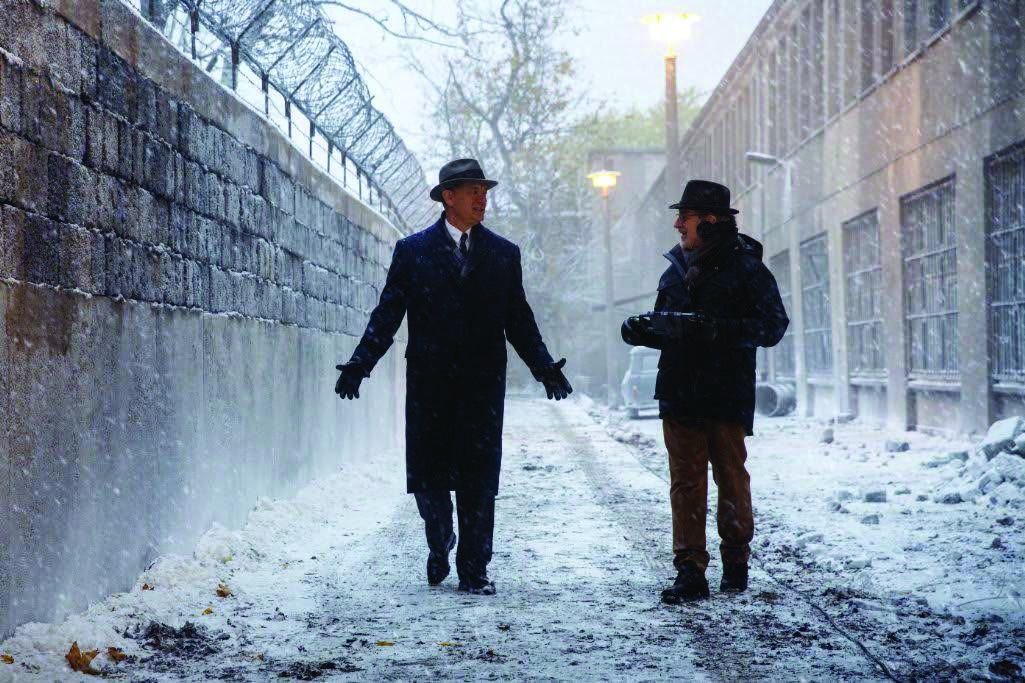Although Bridge of Spies is set during the Cold War, it is a surprisingly timely film. Director Steven Spielberg’s new release repeatedly challenges the legal representation of enemy combatants, a question that America’s justice system has struggled with throughout its history—from John Adams representing the British soldiers responsible for the Boston Massacre to the rights of captured terrorists in Guantanamo Bay. This theme’s prevalence throughout the movie helps make the story feel relevant. In the more than capable hands of Spielberg, Bridge of Spies triumphs as both a historical piece and a drama.
Bridge of Spies is set in 1957, and flawless production design certainly sends viewers back to the ‘50s, particularly during the scenes set in Russia. Spielberg blends CGI and practical sets to recreate war-torn Berlin, and the atmosphere heightens the tension of the negotiations between the protagonist, James B. Donovan (Tom Hanks), and his Soviet counterparts. Hanks is perfectly cast as Donovan, the ultimate ordinary man. It’s the type of performance that Hanks could give in his sleep, but he still does a sublime job of reflecting Donovan’s inner turmoil as he tries to balance his work with his family’s safety. Donovan, an insurance lawyer, is an extremely moral character who fights for the rights of Rudolf Abel, a captured Soviet spy (Mark Rylance).
The relationship between Donovan and Abel is one of the highlights of the film. The two develop a mutual respect as the plot progresses, and Abel becomes an extremely sympathetic character by the time Bridge of Spies ends. There’s a certain sadness that permeates Rylance’s performance, and Spielberg takes pains to establish Abel’s humanity. The film begins with an extended, non-verbal sequence that introduces his character, and it’s almost a surprise when he is revealed to be the spy in the first five minutes. Indeed, he’s no evil Russian genius, but instead a very relatable and respectable human being.
The primary conflict concerns Donovan’s need to reconcile protecting his family with doing his job. A scene involving an attack on his home is one of the more startling moments in the movie, although Spielberg restrains from making it too intense. The aftermath of this scene is extremely telling of Donovan’s character. When the officer chides him for defending a Soviet spy, Donovan simply says he’s doing his job, just as the police officer should be doing his. Donovan is clearly a man of principles, and these types of interactions throughout the film show his devotion to doing the right thing.
Underneath the driving conflicts, small details serve to enrich Hanks’s performance. A running joke throughout Bridge of Spies is Donovan’s inability to adjust to the chilly German climate. He has to trade his overcoat away for directions through Berlin. This seems like a relatively useless plot point, but it serves to further illuminate Donovan’s humane, almost ordinary character. He is far from a typical hero, and his aversion to cold illustrates how out of place he is in a dangerous city.
It’s the human element in Bridge of Spies that keeps it grounded. There’s very little talk of politicians or leaders, and the central conflict is low-stakes, yet intense. Spielberg directs with restraint, shying away from big set-pieces and preferring to take a slow-burn approach. There are some intense scenes littered throughout, but they serve to drive the characters and plot forward instead of dominating the film. For example, the crash of the U2 spy plane is tightly edited and pulse-pounding, but it does not feel out of place in the character drama. This focus on dialogue-driven scenes makes the movie drag at parts, but it pays off in character development.
Bridge of Spies succeeds because it glorifies the ordinary man. Donovan works as a seemingly bland insurance lawyer who does not pretend that he leads an exciting or dangerous life. When he’s thrust into the responsibility of negotiating for the lives of two Americans, he accepts the task at hand, not because he wants the fame or glory, but because he believes that it’s his duty as a man of the law. He struggles with reconciling this job with the danger he puts his family in, but in the end, he manages to do the right thing. The film reflects that, in a global struggle between two superpowers, what really mattered were the everyday people who made a difference in whatever way they could.






